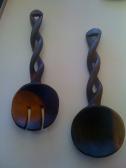Marc Lesser's Blog, page 34
July 15, 2011
Creative Tension
"The essence of personal mastery is learning how to generate and sustain creative tension in our lives." - Peter Senge, The Fifth Discipline
Personal mastery is the practice of increasing our awareness, reducing our blind spots, and developing our responsiveness. Creative tension can be defined as the gap between where we are now and what we want. This creative tension might exist in many aspects of our lives – our relationships, our work, particular projects and aspirations, or creative endeavors such as writing, or art, or something physical. Or it might be in answering the question, what is my calling; why am I here on this planet?
June 14, 2011
Cooking/Kitchen Meditation

"When you prepare food, do not see with ordinary eyes and do not think with ordinary mind."
This quote is from a document titled Instructions to the Head Cook, written by Eihei Dogen in 13th century Japan. Dogen is one of the most revered teachers in the Zen tradition. His temple, Eiheiji is one of the premier training temples in Japan today.
I find it an encouraging and inspiring reminder for the 21st century; how to cultivate an attitude of caring, a spirit of generosity and of focus, right here in my kitchen. I can do this while chopping vegetables, steaming kale, or washing dishes. Meditation, bringing awareness and focus to day-to-day activities, can be done anywhere, even in the kitchen.
May 23, 2011
Ordinary Mind Is The Way

We learn from the past what to predict for the future and then live the future we expect.... Predictions based on the past allow for more efficient brain function in the present, but can lead to mistakes.
— Regina Pally, The Predictive Brain
In the Zen tradition, there is a famous dialogue between two leading teachers in sixth-century China, a time when Zen was flourishing. One teacher asked another: "What is the Way?" This is another way of asking — How can I live a happy, meaningful life? Or, How can I find real freedom? The other teacher responded, much to the first teacher's surprise, "Ordinary mind is the Way."
May 2, 2011
Embracing Change
"Put aside the intellectual practice of investigating words and chasing phrases, and learn to take the backward step that turns the light and shines it inward."
These words are from Zen teacher Dogen Zenji who lived in Japan during the 13th century. I mentioned this "backwards step" to a friend recently and he replied, "but be careful; don't take it when you are standing at the edge of a cliff."
We laughed, and in thinking more about his comment, the problem, when it comes to change, is that we always think we are standing at the edge of a cliff, though, of course, we rarely are. Letting go of the known, familiar and comfortable is difficult. What we don't know feels dangerous. This, I think, is why we hold on so tightly to what we have and know, even if it is not serving us. This must be where the expression "The devil you know is better than the devil you don't" comes from; reinforcing the idea that change is always bad.
April 16, 2011
Day Of Mindfulness/Weekly Sabbath

When my two children were in elementary school, a weekly day of doing less was an important part of our family ritual. We borrowed some ideas from the Jewish Sabbath as well as Buddhist Day of Mindfulness practices. At the heart of our day we had three simple rules that we applied from sundown on Friday until sundown on Saturday evening:
Rule #1: There was no spending money.
Rule #2: There was no watching television.
Rule #3: We did something together as a family.
These three guidelines produced significant results in the quality of those twenty-four hours. What a relief to not buy anything, not have the television on, and spend time simply enjoying each other's presence. My wife and I talked more with our two children; we read books, told stories, played games, went for walks, and shared meals. The biggest benefit of this structured break was that, for a day, the pace of our lives slowed down and our family connections increased.
March 25, 2011
How Do We Decide? Perched On Top Of a 100 Foot Pole
To go to war or not to go to war? To act or to wait and see? Women's rights or the rights of the unborn? Collaborate or challenge? Step forward or step back?
What is our real motivation? How do we decide? Where do we stand?
There is a story, a koan in Zen: "How do you step from the top of a 100 foot pole?"
March 7, 2011
Goals and Intentions

The goal of our life's effort is to reach the other shore…the true wisdom of life is that in each step of the way, the other shore is actually reached. To reach the other shore with each step of the crossing is the way of true living.
- Shunryu Suzuki, from Zen Mind Beginner's Mind
It is important to have goals, in our work and in our lives outside of work. Goals provide a target to aim for, whether we want to reach certain revenues, develop new products, reduce disease or violence, or lose weight. Goals provide benchmarks and allow us to make appropriate and useful adjustments as we move along the path toward meeting these goals.
February 7, 2011
Your Five-Year and Ten-Year Plan
I was recently celebrating my friend Darlene Cohen's life by re-reading one of her books, Turning Suffering Inside Out. Darlene was a wonderful, brilliant, outrageous person, and long-time Zen teacher. She suffered much of her life from severe rheumatoid arthritis. She embodied her teaching through working with and learning from her difficulty, and exuded both joy and wisdom.
I often think about my plans and my future. I imagine we all do. In Darlene's book she writes about the time in her life when she and her husband and son left residence in the San Francisco Zen Center. Darlene was a teacher for many students and also had a practice of helping people who were in physical plan. Many of her clients began to be concerned about her and asked about her financial plans and her life plans. She began to feel irresponsible, especially since she had a family, and decided that she did indeed need to develop a five-year and ten-year plan.
January 31, 2011
Less Fear. More Time
If it seems as though there is never enough time to accomplish all that we intend to do in a day, perhaps it's all Benjamin Franklin's fault. In 1784 he famously declared "Time is money." His intention was to motivate people to work more and shun "idleness." He worried about the young country's potential to generate industry and be innovative and industrious. How the pendulum has swung!
January 14, 2011
Work As A Sacred Practice

"Don't be a board-carrying fellow." This expression, sometimes used in Zen, refers to a carpenter carrying a long, wide wooden board on his shoulder, blocking his view in one direction. It is an admonition about seeing the world and ourselves as ordinary and mundane without also considering the sacred, mysterious, and unfathomable aspect of our hearts, minds, and surroundings.
This expression can also help us understand that our work is not separate from our lives. One side, an important and vital side of work, involves goals, achievements, money, ambition, and developing your career. Understanding and implementing the technical and strategic aspects of your work are critical for your organization or business to fulfill its mission.



